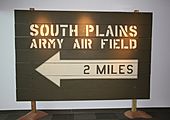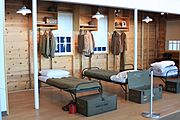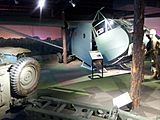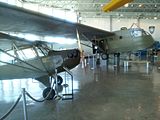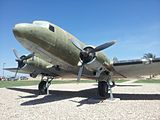Silent Wings Museum facts for kids
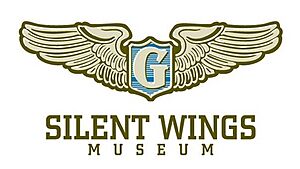 |
|
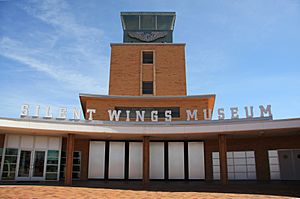
Front entrance
|
|
| Lua error in Module:Location_map at line 420: attempt to index field 'wikibase' (a nil value). | |
| Established | 20 October 2001 |
|---|---|
| Location | Lubbock County, Texas |
| Type | Historical museum |
| Owner | National World War II Glider Pilots Association, City of Lubbock |
The Silent Wings Museum in Lubbock, Texas, tells the amazing story of World War II glider pilots. These brave pilots flew special aircraft without engines, helping soldiers and supplies get into battle zones quietly. The museum is located in an old airport building from the 1950s and 1960s. It keeps the memory of these "silent wings" alive for everyone to learn about.
Contents
The Story of Silent Wings
The museum stands on a historic spot. It was once the World War II South Plains Army Air Field. From 1942 to 1945, this field was a training ground for glider pilots. They learned to fly gliders and also how to fly regular planes.
What Are Gliders?
Imagine a giant airplane that doesn't have an engine! That's a glider. These "silent wing" aircraft were pulled into the sky by other planes. Once released, they would glide silently, carrying soldiers and supplies. This quiet approach helped them sneak behind enemy lines without being easily detected.
Why Lubbock Was Chosen
Lubbock was a great place for glider training. It has a dry climate, warm weather, and usually clear skies. These conditions are perfect for gliding. The area's natural air currents also helped gliders stay in the air. Today, the museum and the nearby Lubbock Preston Smith International Airport cover parts of this historic training area.
How the Museum Began
In 1971, many former U.S. Army Air Force glider pilots formed a group. They called it the National World War II Glider Pilots Association, Inc. Their goal was to keep the history of the U.S. glider program alive. They also wanted a place for pilots to meet and share their stories.
One of their first big projects was to find and fix up a WACO CG-4A glider. This was a common type of glider used in the war. They found one sitting on top of a tire store in Fresno, California! After the war, it had been bought as military surplus and used as an advertisement.
In 1979, the glider was bought and carefully restored. It was ready just in time for the pilots' yearly reunion in Dallas. After the reunion, plans began to build a museum to give this important glider a permanent home.
Finding a Permanent Home
The first Silent Wings Museum opened in Terrell, Texas in 1984. But by 1997, the pilots realized they needed a bigger, more lasting home for their museum. The city of Lubbock stepped forward with an offer. Many of the original pilots had trained there, so it felt like the perfect place.
The pilots agreed to the move. The Terrell museum closed in January 2001. Later that year, in October, the new Silent Wings Museum opened. It was built on the very site of the old South Plains Army Air Field. The restored CG-4A glider became the main attraction.
What You Can See at the Museum
The museum offers a lot to explore. You can start by watching a 15-minute film. It's called Silent Wings: The Story of the World War II Glider Program. After the film, you can walk through different galleries.
You'll see many interesting things, including:
- A fully restored WACO CG-4A glider, just like the one used in the war.
- A TG-4 trainer glider, used to teach pilots.
- Equipment used by airborne soldiers.
- A small model of a barracks, like the ones soldiers lived in at the Lubbock Army Air Field.
- A special project: the restoration of a British Horsa Glider. You can see history being brought back to life!
Learning More About Gliders
The Silent Wings Museum also has an Adams Research Library. This library holds many books and old documents about the World War II military glider program. If you're really interested in learning more, you can schedule a time to do research there. The museum also offers programs and speakers who can visit groups to share stories about gliders.
Gallery
-
Douglas C-47 Skytrain in front of the museum
See also
- American Wind Power Center
- Lubbock Lake Landmark
- Museum of Texas Tech University
- National Ranching Heritage Center
- Glider snatch pick-up
 | Lonnie Johnson |
 | Granville Woods |
 | Lewis Howard Latimer |
 | James West |



